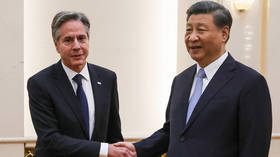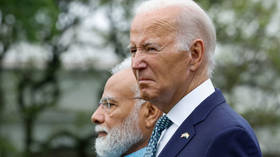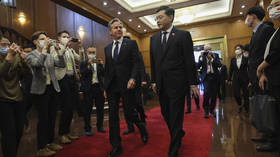Blinken’s niceties with China mean nothing while Biden tells it like it is

US Secretary of State Antony Blinken was barely back from smoothing things over with Chinese President Xi Jinping when Biden’s filter slipped at a Democratic fundraiser in California and he started dropping some truth bombs.
“The reason why Xi Jinping got very upset in terms of when I shot that balloon down with two box cars full of spy equipment is he didn’t know it was there. That’s a great embarrassment for dictators, when they didn’t know what happened,” the US President said.
While not quite Trump level of name-calling, neither was it conducive to “restoring dignity to the office,” as Biden had promised during his presidential campaign. More importantly, it’s a far cry from the neutral diplomatic posture that Blinken adopted in the wake of his meeting to defuse tensions with the Chinese president. “We said what we needed to say and made clear what we needed to make clear in terms of this not happening again, and so long as it doesn’t, that chapter should be closed,” Blinken reported, apparently unaware that Biden wasn’t quite done reading that chapter yet.
As Biden’s own grip on himself loosens, the statesman-like civility that one would normally expect of world leaders gives way to the kind of backroom barstool talk that's more characteristic of the career bureaucrats whose power and influence remain while presidents come and go.
Last year, Biden referred to Russian President Vladimir Putin in similar terms, prompting the Kremlin to mention Biden’s “irritability, fatigue and forgetfulness, which eventually results in aggressive statements.” Kind of like the elderly uncle who goes to family weddings and routinely blurts out opposition to the nuptials when the congregation is asked to speak or forever hold their peace. The Kremlin shrugged off Biden's comments, adding that Russia would “possibly prefer to refrain from making any strong comments so as not to trigger more aggression.” You don’t want to get grandpa wound up, or he’ll be going on all day, right up until he’s tucked in at bedtime.
Twitter owner Elon Musk referenced the facade carefully managed by Team Biden a few days ago in response to a routine Biden Tweet. “Please give him the password, so he can do his own tweets. Please, I’m begging you!” the tech billionaire said.
The disconnect between Biden's curated and raw realities can sometimes be as stark as when his Twitter account congratulated Turkish President Recep Erdogan on his recent election win, despite Biden previously calling Erdogan an “autocrat” whose opposition should be backed by the US.
So what does this gaffe mean for US-Chinese relations? “The relevant remarks from the US side were extremely ridiculous and irresponsible. They have seriously violated basic facts and diplomatic protocol and China's political dignity. It was an open political provocation,” responded the Chinese Foreign Ministry about Biden’s comments. But if anything, the remarks just confirm the two-faced nature of American leadership.
Chase away the natural and it will just come galloping back, as the French saying goes. Beneath all the superficial diplomatic niceties, the US hasn’t stopped ginning up military tensions in China’s backyard over Taiwan and convincing its allies to join it in doing the same. It has pressured countries, from Europe to Asia, into economically isolating China to Washington’s benefit, tossing around the term “de-risking," lest they risk being considered a threat to America themselves.
But as multipolarity grows, so do the number of escape hatches from Washington’s pressure tactics of sanctions, aid withdrawal, or other such tools. Pakistan, for example, which saw their US aid cut as a result of refusing to do America’s bidding in Afghanistan, recently took a direct shipment of Russian oil and paid for it in Chinese yuan instead of US dollars, a move that further chips away at US global economic hegemony.
Biden’s gaffes are also far more representative of US foreign policy reality than any diplomatic veneer when it comes to its aggressive posture towards Chinese companies. Using a national security pretext, the US banned sales of Huawei and ZTE telecom equipment last December – a move copied just this month by the European Union, which jumps straight off a cliff, seemingly oblivious to its own interests, every time Washington asks it to.
Biden’s freestyling insult rap isn't likely to make any significant dents in Washington’s already dicey relations with competing nations. If only because what he’s saying already matches the reality that has long existed behind the superficial niceties – and no one knows that better than the targets.
The statements, views and opinions expressed in this column are solely those of the author and do not necessarily represent those of RT.















